The 4 Incredible Healthiest Foods for Weight Loss
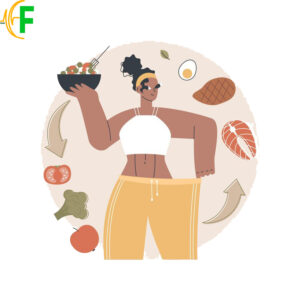
Introduction
In the quest for weight loss, what you eat plays a crucial role. Incorporating certain foods into your diet can help promote weight loss and overall health. In this article, we’ll explore four of the healthiest foods for weight loss, backed by scientific evidence and expert recommendations.
1. Leafy Greens
Leafy greens are nutritional powerhouses packed with vitamins, minerals, and fiber while being low in calories. Incorporating leafy greens such as spinach, kale, Swiss chard, and collard greens into your meals can help you feel full and satisfied without consuming excess calories. Additionally, their high fiber content aids digestion and promotes a healthy gut microbiome, which is linked to weight management.
Studies have shown that diets rich in leafy greens are associated with lower body weight and reduced risk of obesity-related diseases such as type 2 diabetes and heart disease. These vegetables are also rich in antioxidants, which help protect against inflammation and oxidative stress, further supporting overall health.
To incorporate more leafy greens into your diet, try adding them to salads, smoothies, soups, or stir-fries. You can also use them as wraps or substitutes for traditional grains in recipes, such as using lettuce leaves instead of tortillas for tacos.
- Leafy greens such as kale, spinach, Swiss chard, and bok choy are rich in vitamins, minerals, and fiber, promoting overall health .
- They contain antioxidants like lutein, zeaxanthin, beta-carotene, and vitamin C, which support eye health and protect against oxidative stress .
- Leafy greens provide folate, vitamin K, and calcium, benefiting heart health, bone density, and preventing osteoporosis .
- Consumption of leafy greens may help slow cognitive decline with age, potentially due to the neuroprotective actions of lutein .
- Leafy greens, including kale, spinach, Swiss chard, and bok choy, are nutritional powerhouses, offering a wide array of vitamins, minerals, and fiber while being low in calories .
- They contain antioxidants like lutein, zeaxanthin, beta-carotene, and vitamin C, which contribute to eye health and protect against oxidative stress .
- Dark leafy greens are particularly rich in folate, a B vitamin crucial for heart health and preventing birth defects .
- Consumption of leafy greens may slow cognitive decline in older adults, possibly due to the neuroprotective effects of compounds like lutein .
- Including a variety of leafy greens in your diet can support optimal brain function, aid digestion, relieve stress, promote healthy aging, and support bone health.
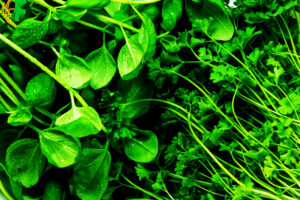
2. Lean Proteins
Protein is an essential nutrient for weight loss and muscle maintenance. Including lean sources of protein in your diet can help you feel full and satisfied, reducing the likelihood of overeating and snacking between meals. Additionally, protein has a higher thermic effect compared to carbohydrates and fats, meaning your body burns more calories during digestion and metabolism.
Some excellent sources of lean protein include poultry (such as chicken and turkey), fish (such as salmon and tuna), tofu, tempeh, legumes (such as lentils and chickpeas), and low-fat dairy products (such as Greek yogurt and cottage cheese). These foods not only provide protein but also contain other essential nutrients like iron, zinc, and B vitamins.
Research suggests that diets high in protein can promote weight loss by increasing feelings of fullness, reducing calorie intake, and preserving lean muscle mass. Protein-rich foods can also help stabilize blood sugar levels, preventing energy crashes and cravings for unhealthy foods.
To incorporate more lean protein into your diet, aim to include a source of protein in each meal and snack. This could be as simple as adding grilled chicken to a salad or enjoying a serving of Greek yogurt with fruit as a snack.
- Lean proteins are low in saturated fat and calories, making them ideal for weight loss and overall health .
- They contain omega-3 fatty acids found in fatty fish, seeds, and nuts, which can reduce blood triglyceride levels and lower the risk of heart disease .
- Research suggests a negative association between heart health and saturated fat, highlighting the importance of choosing lean protein sources .
- Lean proteins support muscle mass development, aid in weight management, and contribute to overall well-being .
- Examples of lean protein sources include salmon, chicken breast, turkey, tofu, beans, and lentils .
- Leafy greens are nutritional powerhouses, rich in vitamins, minerals, and fiber, making them essential for overall health .
- They are high in fiber and low in calories, making them ideal for weight management and promoting satiety .
- Some of the healthiest leafy greens include Swiss chard, turnip greens, kale, collard greens, mustard greens, spinach, and bok choy .
- Dark leafy greens, in particular, are packed with nutrients like folate, vitamin K, and antioxidants, which are beneficial for heart health, bone health, and reducing inflammation .
- Including a variety of leafy greens in your diet can support optimal health and may even reduce the risk of chronic diseases such as heart disease, diabetes, and certain cancers .
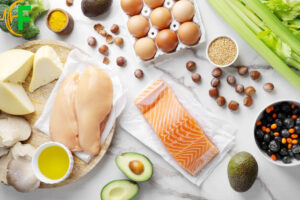
3. Whole Grains
Contrary to popular belief, carbohydrates are not inherently bad for weight loss. However, not all carbohydrates are created equal. Whole grains are a nutritious source of complex carbohydrates, fiber, vitamins, and minerals that can support weight loss and overall health.
Unlike refined grains, which have been stripped of their fiber and nutrients during processing, whole grains retain their natural goodness, making them a more filling and satisfying choice. Examples of whole grains include oats, quinoa, brown rice, barley, bulgur, and whole wheat.
Studies have shown that diets rich in whole grains are associated with lower body weight, reduced risk of obesity, and improved metabolic health. The fiber content of whole grains helps regulate digestion, stabilize blood sugar levels, and promote feelings of fullness, all of which contribute to weight management.
To incorporate more whole grains into your diet, swap out refined grains for whole grain alternatives whenever possible. For example, choose whole grain bread, pasta, and cereal instead of their refined counterparts. You can also experiment with ancient grains like quinoa and farro for added variety and nutrition.
- Whole grains are rich in fiber, vitamins, and minerals, offering numerous health benefits such as reduced risk of obesity, type 2 diabetes, and heart disease.
- They contain nutrients like iron and magnesium, which contribute to lower cholesterol levels and reduced inflammation .
- Eating whole grains is associated with better weight maintenance and improved digestive health due to their high fiber content.
- Unlike refined grains, whole grains retain their fiber, vitamins, minerals, and other nutrients during processing, making them a superior choice for overall health.
- Some examples of whole grains include oats, brown rice, quinoa, barley, and whole wheat.
- Whole grains consist of three parts: the bran, germ, and endosperm, each containing essential nutrients for health .
- Some common whole grains include oats, wheat, corn, rice, barley, quinoa, and sorghum, among others .
- They are rich in fiber, vitamins, and minerals, contributing to various health benefits such as reduced risk of obesity, type 2 diabetes, and heart disease .
- Examples of whole grain foods include whole oats, whole-wheat flour, bulgur, and cracked wheat.
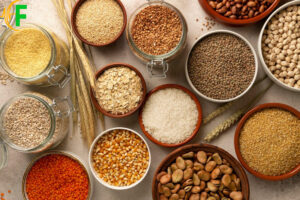
4. Berries
Berries are not only delicious but also incredibly nutritious, making them an excellent choice for weight loss. These colorful fruits are loaded with antioxidants, vitamins, minerals, and fiber while being low in calories and sugar. Their high water content also adds volume to your meals, helping you feel full and satisfied without consuming excess calories.
Some of the most popular berries include strawberries, blueberries, raspberries, and blackberries. These fruits are not only tasty on their own but also versatile ingredients that can be added to a variety of dishes, including smoothies, yogurt parfaits, salads, and oatmeal.
Numerous studies have linked berry consumption to weight loss and improved metabolic health. The antioxidants found in berries help combat inflammation and oxidative stress, which are associated with obesity and related diseases. Additionally, the fiber content of berries supports healthy digestion and may help reduce appetite and calorie intake.
To incorporate more berries into your diet, aim to include them in your meals and snacks throughout the day. You can enjoy them fresh, frozen, or dried, depending on what’s available. Try adding a handful of berries to your morning cereal or blending them into a refreshing smoothie for a nutritious and satisfying treat.
- There are four species of berries featured in Red Dead Redemption 2: Blackberries, Evergreen Huckleberries, Raspberries, and Wintergreen Berries .
- Each type of berry can be found in different locations throughout the game’s world, and players can interact with them to pick and eat them as part of challenges.
- Vitamins and Minerals: Leafy greens like spinach, kale, and Swiss chard are rich in vitamins A, C, K, and folate, as well as minerals such as iron, calcium, magnesium, and potassium.
- Fiber: They are low in calories but high in dietary fiber, promoting digestive health, satiety, and weight management.
- Antioxidants: These vegetables are packed with antioxidants that help combat oxidative stress, inflammation, and chronic diseases.
- Phytonutrients: Leafy greens contain phytonutrients, which have anti-inflammatory and immune-boosting properties .
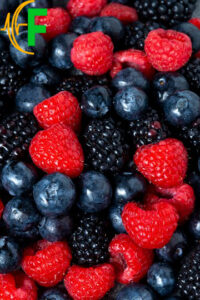
Conclusion
While there’s no one-size-fits-all approach to weight loss, incorporating these four healthy foods into your diet can support your efforts and promote overall health. By focusing on nutrient-dense foods like leafy greens, lean proteins, whole grains, and berries, you can nourish your body while working towards your weight loss goals. Remember to prioritize balance, variety, and moderation in your eating habits for long-term success. With dedication and consistency, you can achieve a healthier weight and improve your overall well-being.




